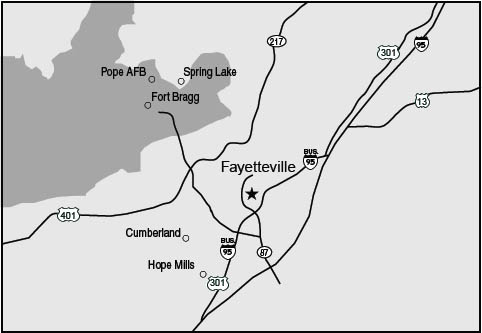
| Fayetteville | |
| Pinehurst and Southern Pines | |
| By Steve Kirk |
The Cape Fear River helps create the temperate conditions that have long drawn tourists to the Sandhills. In the late 19th century, the Sandhills were a retreat for those seeking wellness through a change of climate. Now, the area is a haven for golfers from all over the country. Pinehurst and Southern Pines boast more than 40 championship courses woven among the area’s longleaf forests. Large tracts of farmland have also made the area a site for equestrian shows and competitions of all kinds. Even in the winter, visitors will spot trotters and pacers training on some of the stately farms. Come spring, the big shows are at full canter.
In the 19th century, nearby Fayetteville was an inland port and a hub of the system of plank roads used for overland travel. It was here that Congress later established an artillery training facility called Camp Bragg, where it could lengthen the training season during World War I. Today, Fort Bragg and Pope Air Force Base make up one of the world’s largest military installations. Fort Bragg is the home of the 82nd Airborne and Special Operations units, while the 43rd Airlift Wing calls Pope Air Force Base its headquarters. For military enthusiasts, this town is a dream come true, offering a number of museums dedicated to telling the story of the American fighting man. Fayetteville, which narrowly lost out to Raleigh when the state capital was named, has much to offer history aficionados. And the promise of good weather means a walking tour won’t be rained out.
By Sheryl Monks
The most recent push to soften Fayetteville’s image from that of a town full of roughneck GIs has resulted in a new community slogan: “History, Heroes, a Hometown Feeling!” This resident-led effort aims to develop a stronger sense of community pride and a more harmonious relationship with the area’s two military bases—Fort Bragg and Pope Air Force Base. This time, the town may have hit its mark.
History of all kinds is easy to spot in Fayetteville. The city boasts nearly 60 structures listed on the National Register, including houses, railroad stations, taverns, churches, and even a university; Fayetteville State University is the second-oldest school in the state, after the University of North Carolina at Chapel Hill. This is also a community rich in both Native American culture and African-American culture.
The city has a long military history. During the Revolutionary War, Lord Cornwallis camped outside what is now Fayetteville on his way to meet George Washington’s army at Yorktown. In fact, the city was named after the French hero of the Revolution, the Marquis de Lafayette, who visited the area in 1825, long after the conflict. From that point, Fayetteville’s military history has only grown richer. Fort Bragg was established in 1918, and what is now Pope Air Force Base was organized the following year.
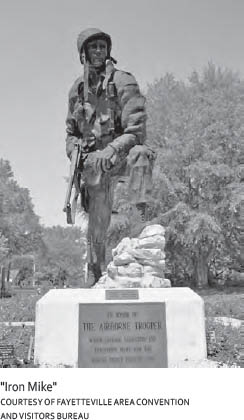
But Fayetteville’s legacy extends beyond its military ties. The city boasts some of the oldest architecture in North Carolina, even though two large fires swept through the town and destroyed over 600 of its buildings. The historic Market House was constructed in 1832 on the site of the old statehouse, where several landmark events—including the ratification of the United States Constitution in 1789 and the chartering of the country’s first state-funded university, the University of North Carolina—took place.
Fayetteville’s fondness for its heroes is apparent. A life-sized bronze statue of the Marquis de Lafayette stands in Cross Creek Park on Green Street. Not far away, at the corner of Randolph and Armistead, is a heroic effigy affectionately known as “Iron Mike,” a giant monument to American paratroopers dropped in desolate places worlds away. One of the primary functions of the Airborne and Special Operations Museum is to glorify the men and women of those elite units. As a mark of respect for another group of brave men, the 35 who earned the Victory Cross, the JFK Special Warfare Museum has a Hall of Heroes. The museum honors Special Operations units from World War II to the present and focuses heavily on Vietnam and the development of the Green Berets.
If Fayetteville doesn’t strike you as a place imbued with hometown feeling, maybe you should look again. Its special events include all-American activities such as fishing and horseback riding. Or maybe you’ll prefer the parades and street festivals that capture the same esprit de corps. One such festival honors North Carolina’s state flower, the dogwood, and another contributes its proceeds to the North Carolina Burn Center, truly exemplifying a community spirit.
So try to look beyond Fayetteville’s battle-hardened surface. You’ll start to see the thinking behind the town’s new slogan. Enjoy your stay. A trip to Fayetteville promises a slew of things to see and do, from touring historic landmarks to shopping for antiques and fine pottery to museum-hopping. With the right attitude, you’ll come away with a greater appreciation for the city and quite likely a renewed sense of patriotism.
JUST THE FACTS
Fayetteville is located just east of Interstate 95 roughly 26 miles south of Interstate 40. It can be reached via U.S. 401, N.C. 24, or N.C. 87.
Fayetteville Regional Airport is south of the city, off Interstate 95 Business. For information, call 910-433-1160.
The Greyhound/Trailways bus station is located at 324 Person Street (28301). Call 910-483-2580.
Over 300,000 residents live in Cumberland County, about 170,000 of them in Fayetteville, the county seat. Fayetteville is the sixth-largest city in North Carolina. About 50,000 Cumberland County residents are members of the armed forces stationed at Fort Bragg or Pope Air Force Base.
The daily newspaper is the Fayetteville Observer-Times. Paraglide is the official newspaper of Fort Bragg and Pope Air Force Base. You can find information and show times in the free publication Up and Coming.
The Fayetteville Area Convention and Visitors Bureau is located at 245 Person Street (28301). Signs provide clear directions from Interstate 95; once you’re there, you can use the convenient drive-through window. The bureau is open Monday through Friday from 8 A.M. to 5 P.M. For information, call 800-255-8217 or 910-483-5311 or check out www.visitfayettevillenc.com.
Things to Do
Historic Places, Gardens, and Tours
The Market House, at the intersection of Green, Gillespie, Person, and Hay streets, was built in 1832 on the foundation of the old statehouse, which burned in the fire of 1831. Within the walls of the statehouse, North Carolina ratified the United States Constitution in 1789 and chartered the University of North Carolina. It was also here that the state ceded its western lands to form Tennessee. The Market House is listed on the National Register. Its ground floor was used as a market for many years, and its upper level housed the town hall. The clock still chimes at 7:30 A.M. for breakfast, at 1 P.M. for dinner, at sundown, and at 9 P.M., which was once the local curfew.
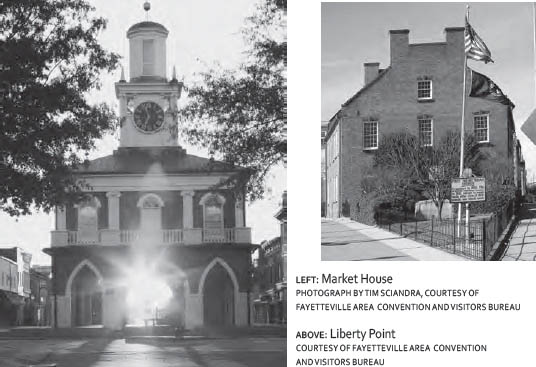
Liberty Point, at Bow and Person streets, is the site where, on June 20, 1775, some 55 patriots signed what is generally known as the Liberty Point Resolves, a petition declaring independence from Great Britain. A granite stone notes the names of the patriots and their pledge to their country at that historic meeting: “We stand ready to sacrifice our lives to secure her freedom.” The building at the site, constructed between 1791 and 1800, is one of the oldest in Fayetteville. For information, call 910-433-1612.
Cool Spring Tavern, at 119 North Cool Spring Street (28301), is thought to have been built in 1788. It is one of the few remaining Federal-style buildings in Fayetteville. Having survived the fire of 1831, it is believed to be the oldest structure in the city. The tavern was built in a failed attempt to entice the men deliberating the location of the new state capital. The decision fell to Raleigh, of course. For information about the tavern, call 910-433-1612.
Cape Fear Botanical Garden, at 536 North Eastern Boulevard/U.S. 301/Inter-state 95 Business (28301), sits at the confluence of the Cape Fear River and Cross Creek. The 85-acre garden contains an old-growth forest and over 2,000 specimens of ornamental plants, making it a beautiful attraction year-round. The signature camellia garden boasts over 200 named varieties. It and other formal gardens are marked with signs that provide both historical and horticultural information. A restored 100-year-old farmhouse and its outbuildings help illustrate the local lifestyle of a century past. An admission fee is charged except for children under five; reduced rates are offered for military personnel, retired persons, and children ages six to 12. The garden is open from 10 A.M. to 5 P.M. Monday through Saturday and from noon to 5 P.M. on Sunday; it is closed on Sunday from mid-December to February. For information, call 910-486-0221 or visit www.capefearbg.org.
The Atlantic Coast Line Railroad Station, at 472 Hay Street (28301), is a rare example of Dutch Colonial architecture. Parts of the station date to World War I. Today, the Amtrak passenger station and the Atlantic Coast Line Depot Railroad Historical Center are housed at the site. For information, call 910-433-1612.
Cross Creek Cemetery #1, on Cool Spring Street, is one of the few cemeteries in the country listed on the National Register. It contains some of the remarkable masonry of famed Scottish artist George Lauder and the graves of many Confederate and Union soldiers, as well as that of Lauder himself. For information, call 910-433-1612.
Evans Metropolitan AME Zion Church, at 301 North Cool Spring Street (28301), was established around 1800 by the Reverend Henry Evans, a free black shoemaker and preacher who was passing through Fayetteville on his way to Charleston and decided to stay. His ministry served both black and white members until the founding of the predominantly white Hay Street Methodist Episcopal Church in the early 1830s. The current Gothic-style building, which dates to 1893–94, is a monument to the craftsmanship of African-American artisans James Williams and Joseph Steward. The church is open by appointment. For information, call 910-483-2862 or 910483-2270 or visit www.evansmetropolitan.org.
St. John’s Episcopal Church, at 302 Green Street (28301), was rebuilt after the 1831 fire in basically the same design as the original structure, with a big exception—10 pyramidal spires replaced the single spire that had topped the church. The extraordinary stained-glass windows, imported from Munich, Germany, are said to have been carried by oxcart from New York; they were installed around the turn of the 20th century. For information, visit www.stjohnsfayetteville.com or call 910-483-7405.
St. Joseph’s Episcopal Church, at 509 Ramsey Street (28301), was established in 1873 by the black members of St. John’s Episcopal Church with the assistance of that church’s rector, the Reverend Joseph Caldwell Huske. Built in the Shingle style with Gothic and Spanish influences, it is notable for the five exquisite “Resurrection windows” by Tiffany and for its pipe organ, built in 1857 by Henry Erben of New York. The organ, purchased from St. John’s for $100, has been powered by hand, water, gas, and now electricity. It is one of the oldest still in use in the country. The church is open by appointment. For information, call 910-323-0161 or visit www.stjoseph-episcopal.org.
Museums and Science Centers
The Airborne and Special Operations Museum, at 100 Bragg Boulevard (28301), opened in 2000 and is one of the area’s premier attractions. Its state-of-the-art educational facilities house exhibits highlighting the feats of Airborne and Special Operations units from 1940 to the present. The museum features graphic coverage of combat missions; extensive displays of uniforms, insignia, and weapons; and information on Airborne songs, marches, and customs. It includes a 250-seat Vistascope theater, a 24-seat Vista-Dome simulator, the Hall of Honors, and a main exhibit gallery. Admission is free, though guests must purchase tickets for the theater and the simulator. The museum is open Tuesday through Saturday from 10 A.M. to 5 P.M. and Sunday from noon to 5 P.M. For information, call 910-643-2766 or visit www.asomf.org.
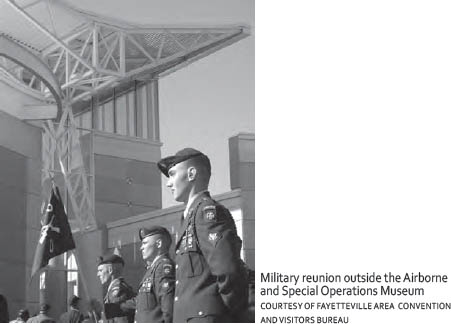
The JFK Special Warfare Museum, located in Building D-2502 at Ardennes and Marion streets, offers a behind-the-scenes look at unconventional warfare. The museum houses weapons, military art, and international cultural items with an emphasis on Special Operations units from World War II to the present. Visitors will find displays covering the evolution of the unconventional warrior, beginning with the Indian scouts of the American West. Exhibits from World War II, Korea, and Vietnam explain the development of the Green Berets. Most exhibits pertain to Vietnam. The heart of the collection is a model of the Son Tay prisoner-of-war camp. In 1970, Colonel Arthur D. “Bull” Simons organized and led a daring attempt to rescue 107 POWs held there. Sadly, the prisoners had been moved before the rescuers arrived. The display explains that the attempt was not in vain, though; the prisoners were still years away from freedom, but their living conditions did improve after the raid. A gift shop is on the premises. Admission to the museum is free. It is open from 11 A.M. to 4 P.M. Tuesday through Sunday, as well as on federal holidays that fall on Monday. For information, call 910-432-4272 or visit www.jfkwebstore.com.
The 82nd Airborne Division War Memorial Museum, at Ardennes and Gela streets, houses over 3,000 artifacts from World War I through Operation Desert Storm. The exhibits include weapons, helmets, uniforms, photographs, aircraft, parachutes, and other items. A film is shown each hour. The gift shop sells out-of-the-ordinary keepsakes. Admission to the museum is free. It is open Tuesday through Saturday from 10 A.M. to 4:30 P.M., as well as on federal holidays that fall on Sunday and Monday. For information, call 910-432-3443 or 910-436-1735 or visit www.bragg.army.mil/18abn/museums.htm.
Fascinate-U Children’s Museum is located at 116 Green Street (28301), next to the Market House. This fun interactive museum allows kids to explore the world around them through creative role-playing. Exhibits include a grocery store, a bank, and a newsroom. The museum is open Tuesday, Thursday, and Friday from 9 A.M. to 5 P.M., Wednesday from 9 A.M. to 7 P.M., Saturday from 10 A.M. to 5 P.M., and Sunday from noon to 5 P.M. An admission fee is charged. For information, call 910-829-9171 or visit www.fascinate-u.com.
The Fayetteville Museum of Art, at 839 Stamper Road (28303), was founded in 1971. Originally housed in the Market House, it moved in 1978 to its present facility, which has the distinction of being the first building in North Carolina designed and built as an art museum. The museum includes two galleries, classrooms, studio space, a library that lends art reference materials and slides, and a museum store. The 5.8-acre grounds and pond offer visitors a place to relax. This parklike setting, an oasis in the midst of a heavily trafficked area, is the site of large-scale sculpture displays, art festivals, and public concerts. Admission is free, though donations are appreciated. The museum is open from 10 A.M. to 5 P.M. on weekdays and from 1 P.M. to 5 P.M. on Saturday and Sunday. For information, call 910-485-5121 or visit www.fayettevillemuseumart.org.
The Museum of the Cape Fear Historical Complex, at 801 Arsenal Avenue (28305), combines a modern museum building, the 1897 Poe House (yes, that’s E. A. Poe, but this Poe was a potter), and the eerie remains of the Fayetteville Arsenal. The museum and the arsenal site are open for self-guided tours; visitors receive a guided tour of the Poe House upon arrival. A gift shop is located in the museum proper. Admission is free. The complex is open from 10 A.M. to 5 P.M. Tuesday through Saturday and from 1 P.M. to 5 P.M. on Sunday. For information, call 910-486-1330 or visit www.ncmuseumofhistory.org/osm/mcf.html.
The Fayetteville Area Transportation Museum is located at 325 Franklin Street (28301) in the former Cape Fear and Yadkin Valley Railway Depot, built around 1890. Its focus is on the area’s evolving means of transportation, from Native American watercraft to plank roads to river steamboats to trains to cars. The museum is open Tuesday through Saturday from 10 A.M. to 4 P.M. Admission is free. For information, visit www.fcpr.us/FayettevilleAreaTransportationMuseum.php or call 910-433-1455.
Cultural Offerings
Cameo Art House Theatre, at 225 Hay Street (28301), shows a variety of classic, independent, and foreign films in a beautifully restored 1920s theater open seven nights a week. For show times, call 910-486-6633 or visit www.cameoarthouse.com.
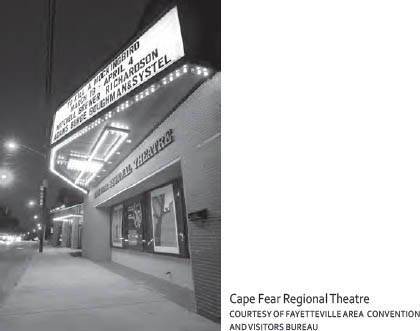
The award-winning Cape Fear Regional Theatre, at 1209 Hay Street (28305), has been around for nearly four decades. Local, regional, and national performers present premieres, musicals, classic dramas, comedies, and children’s favorites in an intimate 325-seat theater. The group’s Studio Performing Arts Program offers courses in acting, voice, and audition techniques for ages eight through adult. For a list of upcoming shows, call 910-323-4233 or visit www.cfrt.org.
The Gilbert Theater is located at 116 Green Street (28301). For over a decade, it has provided quality theatrical productions for children, the elderly, minorities, and the economically disadvantaged while at the same time giving local artists a venue for displaying their diverse talents. The company has produced classics, thought-provoking works such as How I Learned to Drive, children’s puppet shows, and original local and regional plays. The theater involves students whenever possible, both on stage and off. For information, call 910-678-7186 or visit www.gilberttheater.com.
The Fayetteville Symphony Orchestra performs several concerts a year at Reeves Auditorium, Crown Theatre, and Seabrook Auditorium. For information, call 910433-4690 or visit www.fayettevillesymphony.org.
What’s a visit to a military town without reconnoitering an army surplus store? Try Old Sarge’s Surplus, at 240 South Bragg Boulevard/N.C. 87 at the southern edge of Spring Lake (28390), just beyond Fort Bragg’s northern border. This place is so well disguised that it might as well be wearing camouflage. It’s on the west side of South Bragg between Main and Lake Avenue, hidden behind—surprise!—a tattoo parlor and a used-car lot. Turn in where the old army truck and trailer are parked beside the road. Aside from the bin of Rambo-style knives, Old Sarge’s stock is largely non-lethal. For information, call 910-497-5335.
Cape Fear Studios, at 148-1 Maxwell Street (28301) in the downtown area, is a nonprofit art gallery and studio where local artists and craftsmen sell original work such as fine jewelry, pottery, watercolor paintings, pastels, and many other items. For information, call 910-433-2986 or visit www.capefearstudios.com.
DavidR. Walters Antiques, at 1110 Hay Street (28305), specializes in early-20th-century furniture. Antiques and other collectibles are also available. For information, call 910-483-5832.
Angels & Antiques, at 1213 Hay Street (28305), serves all your angel needs—paintings, tree ornaments, statues, figurines, clocks, lamps, dolls, plates, cards, candleholders, nightlights, etc. It also has general antiques. For information, call 910433-4454 or visit www.angelsandantiques.com.
“Antiques with an attitude” describes Not Quite Antiques, at 2829 Raeford Road (28303). The shop specializes in antiques, mid-20th-century items, works by local artists and craftspeople, and unique modern pieces other antique shops may not carry. For information, call 910-323-0300.
Recreation
Docks at the Capitol defies easy description. Housed in an old theater at 126 Hay Street (28301), it encompasses a bowling alley, a video-game parlor, a sports bar and pool hall, a dance venue, a cocktail lounge, a café, a gift shop, a shoe store, a skateboard shop, an ice-cream parlor, and a spa. As a kids’ party spot, it’s Chuck E. Cheese on steroids. For information, visit www.docksatthecapitol.com or call 910-42DOCKS.
The Crown Center, at 1960 Coliseum Drive (28306), offers a wide array of entertainment, from concerts, theater productions, and family shows to amateur and professional sports. The Crown Coliseum is the home of the Fayetteville FireAntz (910-321-0123; www.fireantzhockey.com/home.aspx) of the Southern Professional Hockey League and the Fayetteville Guard (910-202-4753; www.fayettevilleguard.com) of the American Indoor Football Association. For a list of upcoming events at the Crown Center, call 910-438-4100 or visit www.crowncoliseum.com.
J. P. Riddle Stadium on Legion Road hosts games of the Fayetteville SwampDogs baseball team of the Coastal Plain League. For information, call 910-426-5900 or visit http://goswampdogs.com.
Fishermen should check out the 500-foot pier at Lakeview Park Fishing Pier and Campground, located at 377 Waldos Beach Road (28306); for information, call 910424-4814. A couple of boat ramps are located along the Cape Fear River, one at the junction of U.S. 301 and Old N.C. 87 and the other at Riverside Sports Center, at 1122 Person Street (28301). Fort Bragg has 13 lakes that are open to the public, including Muddy Lake, Little Muddy Lake, and Mott Lake; for information, call 910-396-7506.
Smith Lake Riding Stables, located on Smith Lake Road on the Fort Bragg property, offers pony rides, riding lessons, trail rides, and hayrides. Advance notice is required for groups of 10 or more. For information, call 910-396-4510 or visit www.fortbraggmwr.com/stables.php.
Smith Lake Recreation Area, at 1129 Smith Lake Road (28302), offers swimming, picnicking, mountain biking, camping, volleyball and basketball courts, sandy beaches, paintball games, paddleboats, and a water-ski shop. For information, call 910-396-5979 or visit www.fortbraggmwr.com/sportsrec/smithlake/smithlake.htm.
Seasonal Events
The Dogwood Festival, held at 145 Person Street (28301) every April, includes an array of activities, the premier event being a drive along the 18-mile Dogwood Trail, which winds through the downtown historic district and among beautiful residential areas. Symphony performances, rodeos, and street dancing take place all around Fayetteville to celebrate the thousands of blooming dogwoods, azaleas, daffodils, and camellias. For information, visit www.fayettevilledogwoodfestival.com or call 910-323-1934.
The Blues ’n Brews Festival is held on a Saturday in late spring at Festival Park, located downtown on Ray Avenue between Rowan Street and Maiden Lane. Around 15 breweries participate, as do lots of down-home blues performers. Be sure to bring lawn chairs or a blanket. For information, call 910-323-4233 or visit www.cfrt.org/bluesnbrews.php.
Where better to celebrate the Fourth of July than the mother of all military installations? Operation Celebrate Freedom, held on the main parade field at Fort Bragg, is free and open to the public. Visitors enjoy live music, parachuting demonstrations, a flag ceremony, food, and fireworks. For information, call 910-396-9126 or visit www.fortbraggmwr.com/julyfourth.php.
The International Folk Festival has been named one of the top 20 events in the southeastern United States by the Southeast Tourism Society. Held each September on Hay Street in downtown Fayetteville, it pays homage to the region’s diverse cultures. Visitors enjoy a smorgasbord of international foods, an eclectic array of world entertainment, and the highlight—the Parade of Nations. For information, call the Arts Council of Fayetteville/Cumberland County at 910-323-1776 or visit www.theartscouncil.com/International_Folk_Festival.html.

The Holly Day Fair, held in late November at the Crown Center, is a one-stop holiday shopping event that draws about 21,000 visitors. Sponsored by the Junior League of Fayetteville, this is the largest holiday gift-and-craft show in eastern North Carolina. Shoppers can choose from an extensive selection of unique handcrafted and manufactured gifts such as Christmas decorations, jewelry, clothes, toys, food specialties, household accents, and more. For information, call 910-323-5509 or visit www.hollydayfair.com.
Places to Stay
Resorts, Hotels, and Motels
Comfort Inn Cross Creek. Expensive/Moderate. 1922 Skibo Road, 28314 (910867-1777). Located near the mall, the Comfort Inn offers 123 rooms and suites, Jacuzzis, an outdoor pool, and complimentary breakfast. It has been awarded a Two Diamond rating by AAA.
Holiday Inn Bordeaux. Moderate. 1707 Owen Drive, 28304 (877-863-4780 or 910-323-0111; http://hibordeaux.com/). This hotel has 298 rooms. Children stay free. Amenities include 30,000 square feet of meeting space; a concierge; dry-cleaning service; complimentary shuttle service to the airport, the bus station, and the train station; a full-service restaurant; a sports bar; a nightclub; and an outdoor pool.
Hotel Prince Charles. Moderate. 450 Hay Street, 28301 (www.450hay.com; 910433-4444). If you want to stay downtown, your choice is pretty much limited to the Prince Charles. Built in 1924, this beautiful building is listed on the National Register and is a member of the Historic Hotels of America. It’s just around the corner from many of the city’s historic sites and is a good base if you’re interested in a walking tour. Considered one of the finest Colonial Revival structures in Fayetteville, it features exquisite marble floors and staircases, arched Palladian windows and doorways, and beautiful brass railings. Twenty-six oversized guest rooms and 57 luxurious two-room suites are available, all filled with custom period furniture. This is as close to a bed-and-breakfast as you’ll find in Fayetteville. A full-service restaurant and an exercise room are on the premises.
Places to Eat
The Barn of Fayetteville. Expensive. 1021 Bragg Boulevard, 28301 (910-6780686). This fine-dining restaurant specializes in traditional and unique Italian dishes. It offers a full menu of veal, pasta entrées, steaks, chicken, and fresh seafood. It is open for dinner Monday through Saturday.
Hilltop House Restaurant. Expensive. 1240 Fort Bragg Road, 28305 (910-4846699; www.hilltophousenc.com). This beautiful old restaurant is located in the historic Haymount district right across from the Cape Fear Regional Theatre. For 70 years, it has served up steaks, seafood, and Greek specialties at a reasonable rate. Lunch and dinner are served Tuesday through Saturday; brunch is served on Sunday; wine tastings are offered on Tuesday nights.
Mash House Restaurant & Brewery. Expensive/Moderate. 4150 Sycamore Dairy Road, 28303 (910-867-9223; www.themashhouse.com). This microbrewery has won medals at some of the largest beer festivals in the world. And its Kobe beef burgers, wood-fired pizzas, lunch specials, and late-night munchies are great accessories to the beer. The Mash House is open daily for lunch and dinner.
Highlander Café & Pub. Moderate. 1217 Hay Street, 28305 (910-485-4777; www.highlander-of-haymount.com). This Scottish establishment offers traditional pub dishes. It is open daily for lunch and dinner.
Huske Hardware House. Moderate/Inexpensive. 405 Hay Street, 28301 (910-4379905; http://huskehardware.com). This place is worth the trip just to see the building. The 100-year-old structure holds rich significance for Fayetteville. At the time it was built, it was called “Major Huske’s Folly” because it was so far from the Market House. Proving his critics wrong, the major went on to open six hardware stores, all bearing the initials HHH. Now a brewery and restaurant, Huske Hardware House sits in a prime location for visitors to the Airborne and Special Operations Museum. It offers such dishes as “Filet Tips” and “Tomato-Basil Shrimp,” as well as some vegetarian fare, preferably served alongside its signature Airborne Ale. Live music is offered. Lunch is served daily and dinner Monday through Saturday.
Nearby
Bentonville Battleground is located approximately an hour northeast of Fayetteville; take U.S. 701 to S.R. 1008. Bentonville was the site of the last great Confederate charge of the Civil War and the largest battle ever fought in North Carolina. The Battle of Bentonville, which took place in March 1865 between General Joseph Johnston’s Confederate troops and General William T. Sherman’s Union men, ended with 2,500 casualties for the South and 1,500 for the North. The battlefield is now a state historic site that includes a Confederate cemetery, Union trenches, monuments, and a visitor center. It is open Monday through Saturday from 9 A.M. to 5 P.M. Admission is free. For information, visit www.nchistoricsites.org/bentonvi or call 910-594-0789.
The National Hollerin’ Contest is held the third Saturday in June at the volunteer fire department in Spivey’s Corner, located northeast of Fayetteville at the junction of U.S. 13 and U.S. 421. Hollerin’ is an old custom of fieldworkers in the rural South, handed down from generation to generation. The contest is a living celebration of Sampson County, its history, and its people. Admission is free. For information, call 910-567-2600 or visit www.hollerincontest.com.
If you’ve ever visited the Sandhills in summer, you know how oppressive it is just to cross the parking lot to an air-conditioned grocery store. But consider for a moment what some local soldiers put themselves through to defend our country.
The army’s Special Forces qualifying program evaluates tactical skill, leadership, motivation, and ability to cope with stress. Among the program’s components are “Psychology Tests,” “Physical Fitness Tests,” “Swim Tests,” “Runs,” “Obstacle Courses,” “Rucksack Marches,” “Small Unit Tactics,” and “Military Orienteering.” That sounds like good, clean fun—kind of like the Boy Scouts.
Trainees might tell a different story, in the unlikely event you could get them to talk.
The army’s Level-C SERE (Survival, Evasion, Resistance, and Escape) training is conducted at Camp Mackall, part of the Fort Bragg complex. The program is designed for Special Forces operating behind enemy lines—the very people who merit a hefty al Qaeda bounty if killed or captured. At the core is what is blandly called “stress inoculation.” The army says little about it, so as to maximize the anxiety of future trainees. That’s the whole point, after all.
Trainees must learn to live off the land and evade capture if separated from their mates. They must also learn how to resist if imprisoned and tortured.
First, they’re placed in a wilderness setting without food, water, or weapons and hunted down by armed “enemies.” Trainees set about fashioning crude but lethal weapons. They conquer their food aversions by eating turtles, snakes, insects, and worms—whatever they can catch using whatever traps or lures they scavenge or make. Actually, since hunger is looked upon as a stressor to be overcome, any food at all is considered a “crutch.” Most trainees lose 15 or more pounds during the three-week course—and these are people who didn’t carry much fat entering the program.
Next, they’re captured, hooded, roped together, and marched to a mock POW camp complete with guard towers, barbed wire, cages, concrete cells, fake graves, and Third World latrines—but no toilet paper, of course. They’re further starved and subjected to sleep deprivation. Details of the physical and mental abuse aren’t made public—again, in order to keep the stress sky-high for future campers.
The SERE program at Camp Mackall has produced some interesting data. Trainees’ hormonal measurements indicate some of the highest stress levels ever recorded. For example, they encounter stress 25 percent greater than patients facing major surgery and 100 percent greater than first-time sky divers. The data also shows that Special Forces have higher adrenaline levels during stress than do normal soldiers, and that they recover normal adrenaline levels much faster after stress testing is completed. In other words, Special Forces have a superior ability to manage themselves under extreme circumstances.
If you encounter any Special Forces personnel around Fayetteville, give them a nod, ask how long they’ll be in the area, and offer to buy their coffee. But be wary of hitting them up for a tour of Camp Mackall.
Introduction by Sheryl Monks
Sometime in the mid- to late 1800s, a collective hysteria formed in the minds of the upper middle class. They came to think their health was failing. What followed was a preoccupation with sicknesses, both real and imagined, that led to a search for radical detoxification. People looked to Mother Nature for antidotes—sea salt, mineral water, clean mountain mists. During this “Great Age of Inland Spas,” savvy land developers sought to tap into the health craze by promoting some tracts of land as having the power to heal whatever ailed a body.
One such visionary saw the Sandhills as just the sort of place where the infirm might spend a few days recovering from the pollutants of Northern city life. After all, the area’s sandy pine bluffs didn’t seem fit for much else. Only the most resilient Scottish farmers took on the challenge of cultivating the nutrient-poor soil of Moore County, often called “the Pine Barrens” back then. Longleaf pines were truly the only things that seemed to thrive here—perhaps a fact not wasted on John Patrick, the state’s commissioner of immigration, who bought 675 acres in 1883 for less than two dollars an acre in hopes of opening a health resort.
Some called his investment folly. Undeterred, Patrick laid out a town in square blocks and named the streets for Northern states to try to attract visitors from that part of the country. Then he sought the endorsements of doctors on the health benefits of air purified by trees. He advertised in Northern newspapers and brochures, praising the pine-scented air. New York physician G. H. Saddelson wrote this statement for Patrick: “Where the long leaf pine exists, ozone is generated largely and it has been demonstrated that persons suffering with throat and pulmonary diseases are much benefited when living in an atmosphere impregnated with this gas.” Once the seed was planted, Patrick’s concept of a health resort took hold, and the town of Southern Pines grew quickly.
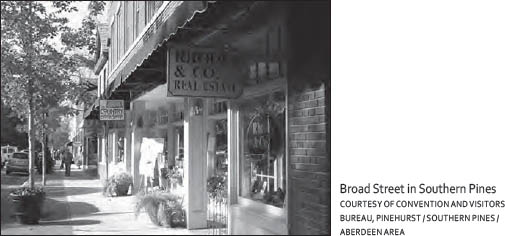
John Patrick’s health resort brought entrepreneur James Tufts to the Sandhills. He and his son Leonard introduced the Scottish game of golf to sanitarium residents as a cure for boredom. Tufts’s purchase of 5,000 or so acres led to the development of Pinehurst Country Club, and the rest is history.
Today, the area maintains its legacy as a place of tranquility. Despite the cosmopolitan features of the sister towns of Pinehurst and Southern Pines—the lively shops, restaurants, and cultural centers—there remains something therapeutic about the pine-scented air. Just look at the lasting popularity of activities such as golf and equestrian events and you’ll see that people still prefer the outdoors to the stale, refrigerated air of the modern indoors.
But you’ll discover more to do in Pinehurst and Southern Pines than just play golf and ride horses. Folks here love the arts. You’re sure to find a long list of high-caliber cultural events going on at any given time. Residents also support the preservation of local architecture. While you’re in the area, take a guided tour through the historic districts. Landmark sites include private homes, churches, and a historic horse track. And don’t forget the nearby Indian village of Town Creek. You’ll also find shopping opportunities that range from pottery outlets and antique galleries to unique gift shops and sprawling malls. And everyone knows that shopping is regenerative to the spirit.
Southern Pines is approximately four miles south of the intersection of U.S. 1 and U.S. 15/501. Pinehurst is four miles to the west, close to the intersection of N.C. 5 and N.C. 2.
Moore County Regional Airport, located at Airport Road and N.C. 22 near Sandhills Community College, offers commuter air service, including daily connecting flights to Charlotte. For information, call 910-692-3212.
Amtrak reservations may be made by calling 800-872-7245. The train stops right in the middle of Southern Pines.
The twice-weekly newspaper in Southern Pines is The Pilot. The local magazine is Pinehurst: The Magazine of the Sandhills.
The number for the local chamber of commerce is 910-692-3926. The Pinehurst, Southern Pines, Aberdeen Area Convention and Visitors Bureau is located at 10677 U.S. 15/501 in Southern Pines (28388); call 800-346-5362 or visit www.homeofgolf.com.
Things to Do
Historic Places, Gardens, and Tours
Pinehurst Harness Track, at 200 Beulah Hill Road South/N.C. 5 (28374), is listed on the National Register of Historic Places. Horses have long been a feature of the Sandhills. In the early days of the resort, they helped in the construction and care of the golf course and in ferrying guests from the nearby railroad station. Constructed around 1915, the track was the winter home of polo ponies, hunter horses, racehorses, and Standardbreds. Owners, trainers, and resort guests enjoyed friendly competition during the Wednesday matinee programs. Today, Standardbred training occurs from October to May. Track events include spring races, horse shows, and polo matches. The track is operated by the village of Pinehurst. It is open daily year-round from 8 A.M. to dusk. Guided tours are available. For information, visit www.villageofpinehurst.org/VillageGovernment/Departments/HarnessTrack/tabid/126/Default.aspx call 800-644-TROT or call 910-295-4446.
The Shaw House properties are located at 110 Morganton Road in Southern Pines (28387). Listed on the National Register, this trio of early structures depicts the daily life of the area’s first settlers. The Shaw House, built around 1840 by Charles Shaw, is nothing like the antebellum plantation homes that usually come to mind. Much less extravagant, it exemplifies sturdy simplicity. The Garner House, built around 1830, is a log structure boasting wide-board heart-pine paneling, original hand-forged hinges, and board doors. The Britt-Sanders Cabin (also known as “the Loom House”) is a simple one-room pioneer home with a loft. The latter two houses were restored and moved to their present locations by the Moore County Historical Society. All three homes are open Tuesday through Friday from 1 P.M. to 4 P.M. Admission is free, though donations are welcome. For information, call 910-692-2051 or visit www.moorehistory.com.
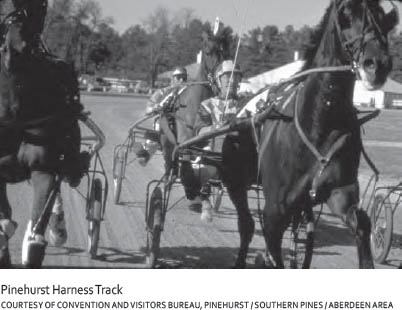
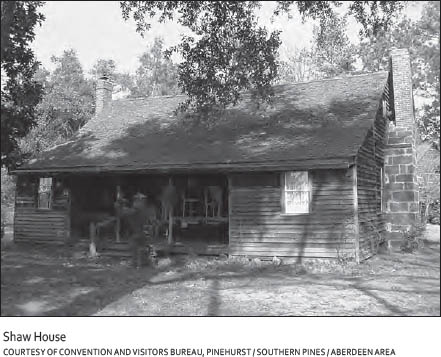
Museums and Science Centers
Weymouth Woods–Sandhills Nature Preserve, at 1024 Fort Bragg Road in Southern Pines (28387), tells visitors about the importance of longleaf pine forests. Its interactive hands-on exhibits cover topics from prescribed burning to the naval-stores industry in the Sandhills. Built in 1978, the exhibit hall was renovated in 2001 and again in 2006. Located in the park’s visitor center, it is open from 9 A.M. to 5 P.M. daily. Interpretive programs are held in the auditorium at the visitor center every Sunday at 3 P.M. from April through November. Outside, hikers may observe nearly 500 plant species and a number of animal species along more than four miles of well-marked, easy-to-hike trails in the wooded nature preserve. Guided tours are offered. The nature preserve is open from 8 A.M. to 8 P.M. March through October and from 8 A.M. to 6 P.M. November through February. Admission is free. For information, call 910-692-2167 or visit www.ncparks.gov/Visit/parks/wewo/main.php.
Cultural Offerings
The Weymouth Center for the Arts and Humanities, at 555 East Connecticut Avenue in Southern Pines (28387), has flourished as a cultural center since 1979. Once the home of North Carolina author James Boyd and his wife, Katharine Lamont Boyd, the center is a portion of the house built by the author’s grandfather. Upon the elder Boyd’s death, grandsons James and Jackson split the house in two. They hauled the main portion by mule across the road, where it became the Jackson Boyd House; now known as the Campbell House, it serves as the home of the Arts Council of Moore County. The portion that became the Weymouth Center was redesigned and enlarged in the 1920s by Aymar Embury II, a friend of the Boyds who went on to become the official architect of Princeton. Then as now, the building served as a center for literary activity, hosting visits from such friends as F. Scott Fitzgerald, Thomas Wolfe, Paul Green, and Sherwood Anderson. Today, the center has a writers-in-residence program that offers writers and composers stays of up to two weeks to pursue their work. Over 600 artists have taken advantage of the opportunity; many testify that they accomplished their most creative work in the tranquil, inspiring atmosphere of the Boyds’ former home. All phases of the arts and humanities are included in the Weymouth Center’s programs. The concerts offered by the center feature artists from North Carolina universities, supplemented by nationally and internationally known chamber musicians; local youths are provided an opportunity to participate in a young musicians’ competition. The center hosts frequent readings by acclaimed North Carolina writers and a lecture series that brings in a diverse group of speakers. For information, visit www.weymouthcenter.org or call 910-692-6261.
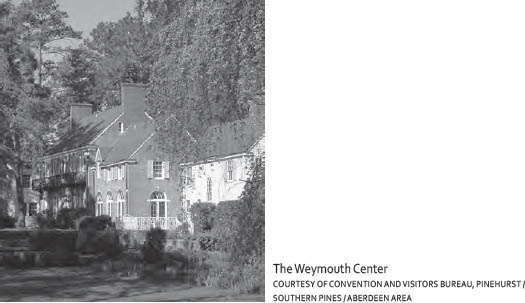
Campbell House Galleries, at 482 East Connecticut Avenue in Southern Pines (28387), is the home of the Arts Council of Moore County. The galleries provide three spacious exhibit areas featuring paintings and pottery for sale by local artists. In addition, tennis and basketball courts and a fitness area are available for public use. The galleries are open from 9 A.M. to 5 P.M. Monday through Friday and from 2 P.M. to 4 P.M. on the third Saturday and Sunday of each month. Admission is free. For information, call 910-692-4356.
Special Shopping
Sandhills Woman’s Exchange, at 15 Azalea Road in Pinehurst (28374), is a coop shop in a historic log cabin. It offers early-American crafts and baked goods for sale. The store is open September to mid-May. The hours are 10 A.M. to 4 P.M. on weekdays and 11 A.M. to 3 P.M. on Saturday. The tearoom on the premises serves lunch Monday through Friday. For information, call 910-295-4677 or visit www.sandhillsonline.com/history/womans.htm.
Recreation
Moore County, known as “the Golf Capital of the World,” has over 720 golf holes (with many more on the drawing board), covering in excess of 270,000 yards. That’s over 153 miles (or 2,700 football fields) of fairways, which are in constant use by the thousands of visitors who come to follow the little white ball. The density of golf-related activities here is said to be the highest in the world. Indeed, the village of Pinehurst and the Pinehurst Resort have been awarded national historic landmark status for their significant role in golf history—the only golf-related designation of its kind in the United States.
Tradition abounds in the land where legends like Jack Nicklaus, Arnold Palmer, Ben Hogan, Sam Snead, and Babe Didrikson Zaharias tested their skills on the finest courses in the world. Nearly 40 championship courses are located in the Sandhills; visitors will find a course suitable for every golfer, regardless of handicap. The courses were laid out by people like Donald Ross (who designed seven local courses), Tom Fazio (who designed four), Robert Trent Jones, Jack Nicklaus, Arnold Palmer, and Gary Player. The area has hosted dozens of major competitions, including the U.S. Women’s Open, the U.S. Open, the PGA Championship, the Ryder Cup, and the World Open. Most major competitions are staged at Pinehurst No. 2.
What follows is a brief overview of a few of the finest courses. For more extensive information, visit www.homeofgolf.com.
Pinehurst Country Club, at 80 Carolina Vista Drive (28374), features eight premier courses. The mecca has long been Pinehurst No. 2, built by golf master Donald Ross. Ross, who always considered Pinehurst his home course, once called it “the fairest test of championship golf I have ever designed.” Recently, this course hosted the U.S. Open in 1999 and 2005. Access is restricted to members and their guests. For information, call 800-ITS-GOLF or 910-295-6811 or visit www.pinehurst.com.
Pine Needles Lodge and Golf Club, at 1005 Midland Road in Southern Pines (28387), opened in 1927. It, too, was designed by Donald Ross. This was the site of the U.S. Women’s Open in 1996, 2001, and 2007. The course is open to the public, based on availability. For information, call 800-747-7272 or 910-692-7111 or visit www.pineneedles-midpines.com.
The Carolina, at 277 Avenue of the Carolinas in nearby Whispering Pines (28327), is an 18-hole course designed by Arnold Palmer. It opened in 1997 and is available to the public. For information, call 888-725-6372 or 910-949-2811 or visit www.thecarolina.com.
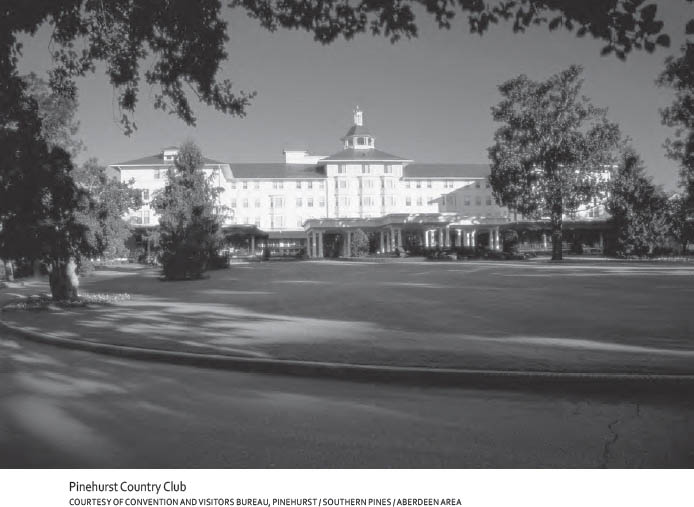
Though golf reigns supreme in the Sandhills, it isn’t the only thing to do. Equestrian activities come in a close second. Between rounds of golf, try Carriage Tours of Pinehurst Village, which will let you explore the quaint town via horse-drawn carriage while learning local history. From Tuesday through Sunday, day and evening tours depart from the Carolina Hotel and the Magnolia Inn; tours last approximately 30 minutes. For information, call 910-235-8456. The McLendon Hills Equestrian Center, located at 275 McLendon Hills Drive/N.C. 211 in nearby West End (27376), offers horseback riding for adults and children eight years and older. Call 910-673-4971.
One of the first things you’ll notice in visiting the area is the abundance of horse farms. Green fields and fences serve as a backdrop to creamy Arabians and grazing, gleaming thoroughbreds. For years, Moore County has been a center for the training of the country’s best Standardbred harness horses, trotters, and pacers, in addition to thoroughbreds. The county has been home to five Olympic equestrian champions.
The Carolina Carriage Classic is held at the Pinehurst track in May. A parade takes place on the Sunday after the classic. For information, call 910-295-4446 or visit www.villageofpinehurst.org/VillageGovernment/Departments/HarnessTrack/tabid/126/Default.aspx.
The Carolina Horse Park at Five Points, located at 2814 Montrose Road in Rae-ford (28376), is a premier equestrian center offering national and international competitions, including the popular Stoneybrook Festival and Steeplechase in April. Situated on what was 250 acres of beautiful farmland, the horse park is approximately 12 miles south of Southern Pines. It offers flat fields perfect for show jumping, dressage, and racing, as well as expansive wooded areas that serve as cross-country courses. Gorgeous hardwoods and longleaf pines have been carefully preserved as part of the development plan. For information, visit www.carolinahorsepark.com or call 910-875-2074.
The entire Moore County area, with its beautiful greenery and rolling terrain, is wonderful for cycling. It has been used to qualify and train Olympic bicycle teams and is the site of the Tour de Moore Century Ride, which draws cyclists from around the world each Labor Day. The feature race, as the name suggests, is 100 miles around Moore County. Several levels of competition are offered. For information or a map of the course, call 910-692-4494 or visit www.rainbowcycles.com.
Places to Stay
Resorts, Hotels, and Motels
Pine Needles Lodge and Golf Club. Deluxe. 1005 Midland Road in Southern Pines, 28387 (800-747-7272 or 910-692-7111; www.pineneedles-midpines.com). For three generations, the legendary Peggy Kirk Bell and her family have been welcoming guests to Pine Needles Lodge and Golf Club. Here, you’ll find the ideal atmosphere in which to improve your golf game, vacation with family and friends, or hold a business function. Golf Digest has awarded this resort a Four Star rating. You’ll play on a Donald Ross course that has been the site of the U.S. Women’s Open multiple times. And when you’re not on the course, you’ll enjoy the at-home feeling of one of the 11 rustic cabins. The resort offers a bed-and-breakfast option at the 1920s Georgian-style Mid Pines Inn; to reserve a room there, call 910-692-2114.
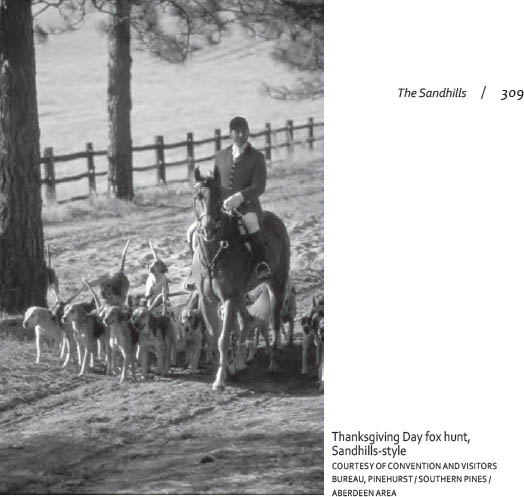
Pinehurst Resort Hotel. Deluxe. 80 Carolina Vista Drive in Pinehurst, 28374 (800-487-4653 or 910-235-8507). This is where it all began in Pinehurst, and it doesn’t get any more luxurious. The resort encompasses The Carolina, The Holly Inn, The Manor, and The Villas. It offers a total of 530 rooms, all of which have nightly turndown service, in-room mini-bars, room service, express checkout, and data ports. Each has access to the concierge desk at The Carolina, which can arrange a host of services. Handicapped-accessible and nonsmoking rooms are available. The resort offers meeting space and health-and-fitness facilities. Recreation options include swimming, fishing, windsurfing, and canoeing. The Pinehurst Post, issued weekly to all guests, gives a rundown of the many activities and services at the resort.
Residence Inn by Marriott. Deluxe/Expensive. 105 Bruce Wood Road off U.S. 15/501 in Southern Pines, 28387 (910-693-3400; www.marriott.com). This friendly all-suites hotel is just right for the casually inclined. Its quiet, comfortable suites include living rooms and fully equipped kitchens. The inn offers an outdoor pool, a fitness center, complimentary continental breakfast, and packages at over 40 local golf courses. It is centrally located between Southern Pines and Pinehurst.
Inns and Bed-and-Breakfasts
The Knollwood House. Deluxe. 1495 West Connecticut Avenue in Southern Pines, 28387 (910-692-9390; www.knollwoodhouse.com). This gracious and stately home, built in 1927 as a holiday retreat for a wealthy Philadelphia family, was renovated and restored in 1992. Since then, it has become one of the area’s premier bed-and-breakfasts. Set on five acres amid azaleas, holly trees, longleaf pines, and towering magnolias, the English manor–style home is beautifully decorated. The sunlit garden room, filled with flowering plants and wicker furniture, offers a view of the back lawn and gazebo and a glimpse of the 14th and 15th fairways of the famous Donald Ross course at Mid Pines. The Knollwood House is within easy walking distance of the lovely Southern Pines shopping district. Special golf packages are available.
Magnolia Inn. Deluxe/Expensive. 65 Magnolia Avenue in Pinehurst, 28374 (800-526-5562 or 910-295-6900; www.themagnoliainn.com). This century-old mansion has 11 guest rooms furnished with period antiques. It offers an English pub, a more formal restaurant, and an outdoor pool. The location is perfect for a downtown stroll. Golf packages are available.
Old Buggy Bed-and-Breakfast Inn. Expensive. 301 McReynolds Street in Carthage, 28327 (800-553-5247 or 910-947-1901; www.oldbuggyinn.com). This lovingly restored Victorian bed-and-breakfast lies in the heart of the Sandhills. W. T. Jones, president of the Tyson-Jones Buggy Manufacturing Company, built the 6,000-square-foot home for his wife, Florence, in 1897. Today, it stands at the entrance to Carthage’s beautiful historic district, only minutes from the Pinehurst and Southern Pines golf resorts. Guests enjoy the inn’s fanciful gingerbread trim, extravagant woodwork, old-fashioned wraparound porch, private swimming pool, verandas, and gardens. A gourmet breakfast and afternoon refreshments are provided. The inn offers special Murder Mystery Weekends and Romance Weekends.
As you might expect, the area offers top-notch dining establishments. Each of the resorts has its own first-class restaurant; if you have the wherewithal and the proper attire, you will find excellent food and service at any of them.
Ashten’s Restaurant & Pub. Expensive. 140 East New Hampshire Avenue in Southern Pines, 28387 (910-246-3510; www.ashtens.com). This restaurant’s globally inspired cuisine encompasses Japanese, Italian, English, Indian, and other influences. Ashten’s was a 2009 finalist in the “Best Dish NC” contest, sponsored by the North Carolina Department of Agriculture. It serves brunch on Sunday and dinner Tuesday through Sunday.
Chef Warren’s. Expensive. 215 Northeast Broad Street in Southern Pines, 28387 (910-692-5240; www.chefwarrens.com). Chef Warren’s has a cozy, open kitchen and a mouth-watering menu. This upscale restaurant offers nightly specials, a seasonal menu, and an extensive wine list. It serves locally grown organic products whenever possible. Dinner is served Monday through Saturday.
Dugan’s Pub. Moderate. 2 Market Square in Pinehurst, 28374 (910-295-3400; www.duganspub.net). This full-service restaurant and pub boasts the largest selection of imported drafts in Pinehurst, as well as a complete wine list. Located in the Village Shops area, Dugan’s has a traditional Irish pub upstairs and a second pub downstairs. Live entertainment is offered on Friday and Saturday nights. Lunch and dinner are served daily.
Squire’s Pub. Moderate/Inexpensive. 1720 U.S. 1 South in Southern Pines, 28387 (910-695-1161; www.thesquirespub.com). A tradition in Southern Pines, Squire’s serves Irish fare in a casual pub atmosphere. It offers the usual entrées—shepherd’s pie and corned beef and cabbage. It also has a delicious, light trifle. Lunch and dinner are served Monday through Saturday.
Nearby
Bethesda Church and Cemetery, on N.C. 5/Bethesda Road in Aberdeen (28315), was built around 1790. Among its points of interest are “the Old Slave Gallery,” bullet holes from a Civil War battle, and graves of area pioneer settlers. Listed on the National Register, Bethesda Church and Cemetery hosts an annual homecoming the last weekend in September. Guided tours for groups are available by appointment. Admission is free, though donations are welcome. For information, call 910-9441319.
The Bryant House and the McLendon Cabin, located at 3361 Mount Carmel Road west of Carthage (28327) in the Harris Crossroads area, are two unaltered historic properties that depict early Moore County life. Built around 1820, the Bryant House has two fine mantels and handmade doors. The McLendon Cabin, constructed around 1760, is the county’s oldest structure in its original location. The site is about a 15-minute drive from Pinehurst. Guided tours are available. The structures are open from 2 P.M. to 4 P.M. on the second and fourth Sundays from May through October. Admission is free, though donations are welcome. For information, call 910-947-3995 or visit www.moorehistory.com.
If you have time, make the short drive north to Sanford in Lee County. Each spring, over 150 potters and 50 artisans and craftsmen converge at the Dennis A. Wicker Civic Center complex at 1801 Nash Street (27330) to participate in the Sanford Pottery Festival. You’ll marvel at the hundreds of exhibits and demonstrations and have a chance to buy some of the finest pottery in the world. For information, call 800-789-2241 or 919-776-0345 or visit www.sanfordpottery.org.
The House in the Horseshoe, at 288 Alston House Road west of Sanford (27330), is so named because of its location in a bend of the Deep River. Now a state historic site, it was built by Philip Alston in 1772, becoming one of the first big houses along North Carolina’s frontier. During the American Revolution, irregular warfare was waged in the back country between bands of Whigs and Tories. Two of the Piedmont’s more notable adversaries were Whig colonel Alston and Tory guerrilla David Fanning. One altercation between their followers left Fanning compatriot Kenneth Black beaten to death. At his friend’s deathbed, Fanning heard Black name Alston as the man responsible. On Sunday, August 5, 1781, Fanning and his men surrounded Alston’s house, trapping the colonel, his family, and a couple dozen of Alston’s militia. When a British officer in the company of Fanning tried to lead a charge, he was shot dead. The direct approach having proved fatal, Fanning’s men remained well covered. Shots were fired back and forth for hours, neither side gaining an advantage. As the day wore on, Fanning tried another approach. His men pushed a cart filled with hay to the side of the house, the intent being to set the hay on fire and burn Alston’s home down around him. Alston’s men frantically debated how they might surrender without being shot in the process. Mrs. Alston, confident that no one would fire upon a woman, took matters into her own hands. Bravely stepping into the yard, she told Fanning that the men inside would lay down their arms if Fanning agreed not to harm them or the house. Fanning agreed after receiving a promise that Alston and his men would not again take up arms in support of the American Revolution.
The house is still riddled with bullet holes today. A reenactment of the skirmish is conducted the first weekend in August. The site is open from 9 A.M. to 5 P.M. Tuesday through Saturday year-round. Admission is free. For information, call 910-9472051 or visit www.ah.dcr.state.nc.us/sections/hs/horsesho/horsesho.htm.
Town Creek Indian Mound, at 509 Town Creek Mound Road in Mount Gilead (27306), is about an hour west of Pinehurst on N.C. 731 off N.C. 73. One of the best reconstructions of pre-white civilization in the country, Town Creek is also North Carolina’s oldest state historic site. Visitors get a glimpse of pre-Columbian life in the Piedmont. The visitor center offers interpretive exhibits and audiovisual programs that bring alive a rich cultural heritage from the buried past. Self-guided tours allow guests to examine the rebuilt structures and mound. The site includes a museum, two temples, a burial house, and a reconstructed palisade wall. Town Creek is open Tuesday through Saturday from 9 A.M. to 4 P.M. and Sunday from 1 P.M. to 5 P.M. Admission is free. For information, call 910-439-6802 or visit www.ah.dcr.state.nc.us/sections/hs/town/town.htm.